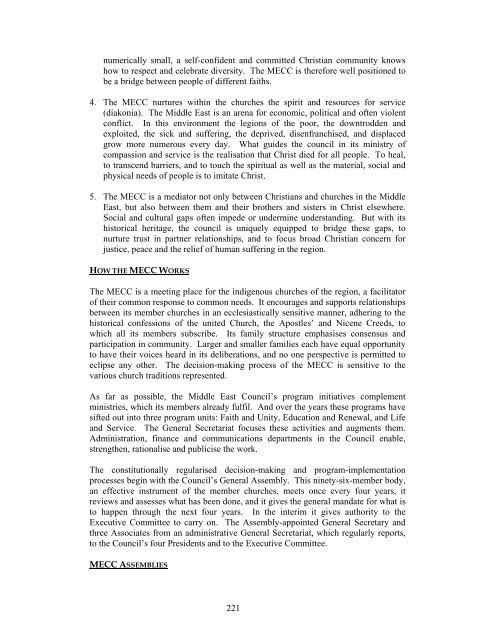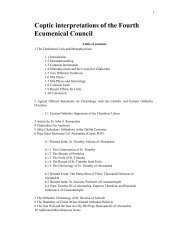Coptic Church & Ecumenical Movement - Saint Mina Coptic ...
Coptic Church & Ecumenical Movement - Saint Mina Coptic ...
Coptic Church & Ecumenical Movement - Saint Mina Coptic ...
Create successful ePaper yourself
Turn your PDF publications into a flip-book with our unique Google optimized e-Paper software.
numerically small, a self-confident and committed Christian community knows<br />
how to respect and celebrate diversity. The MECC is therefore well positioned to<br />
be a bridge between people of different faiths.<br />
4. The MECC nurtures within the churches the spirit and resources for service<br />
(diakonia). The Middle East is an arena for economic, political and often violent<br />
conflict. In this environment the legions of the poor, the downtrodden and<br />
exploited, the sick and suffering, the deprived, disenfranchised, and displaced<br />
grow more numerous every day. What guides the council in its ministry of<br />
compassion and service is the realisation that Christ died for all people. To heal,<br />
to transcend barriers, and to touch the spiritual as well as the material, social and<br />
physical needs of people is to imitate Christ.<br />
5. The MECC is a mediator not only between Christians and churches in the Middle<br />
East, but also between them and their brothers and sisters in Christ elsewhere.<br />
Social and cultural gaps often impede or undermine understanding. But with its<br />
historical heritage, the council is uniquely equipped to bridge these gaps, to<br />
nurture trust in partner relationships, and to focus broad Christian concern for<br />
justice, peace and the relief of human suffering in the region.<br />
HOW THE MECC WORKS<br />
The MECC is a meeting place for the indigenous churches of the region, a facilitator<br />
of their common response to common needs. It encourages and supports relationships<br />
between its member churches in an ecclesiastically sensitive manner, adhering to the<br />
historical confessions of the united <strong>Church</strong>, the Apostles’ and Nicene Creeds, to<br />
which all its members subscribe. Its family structure emphasises consensus and<br />
participation in community. Larger and smaller families each have equal opportunity<br />
to have their voices heard in its deliberations, and no one perspective is permitted to<br />
eclipse any other. The decision-making process of the MECC is sensitive to the<br />
various church traditions represented.<br />
As far as possible, the Middle East Council’s program initiatives complement<br />
ministries, which its members already fulfil. And over the years these programs have<br />
sifted out into three program units: Faith and Unity, Education and Renewal, and Life<br />
and Service. The General Secretariat focuses these activities and augments them.<br />
Administration, finance and communications departments in the Council enable,<br />
strengthen, rationalise and publicise the work.<br />
The constitutionally regularised decision-making and program-implementation<br />
processes begin with the Council’s General Assembly. This ninety-six-member body,<br />
an effective instrument of the member churches, meets once every four years, it<br />
reviews and assesses what has been done, and it gives the general mandate for what is<br />
to happen through the next four years. In the interim it gives authority to the<br />
Executive Committee to carry on. The Assembly-appointed General Secretary and<br />
three Associates from an administrative General Secretariat, which regularly reports,<br />
to the Council’s four Presidents and to the Executive Committee.<br />
MECC ASSEMBLIES<br />
221








